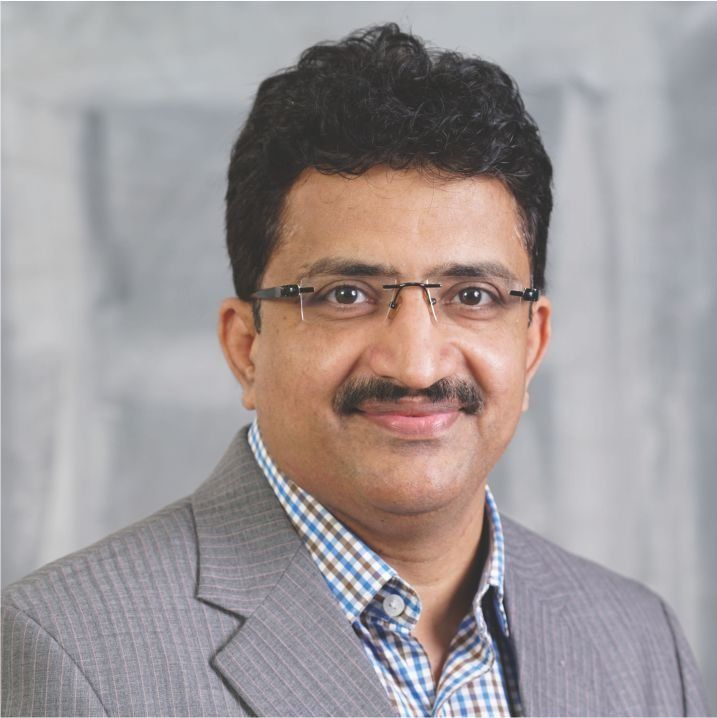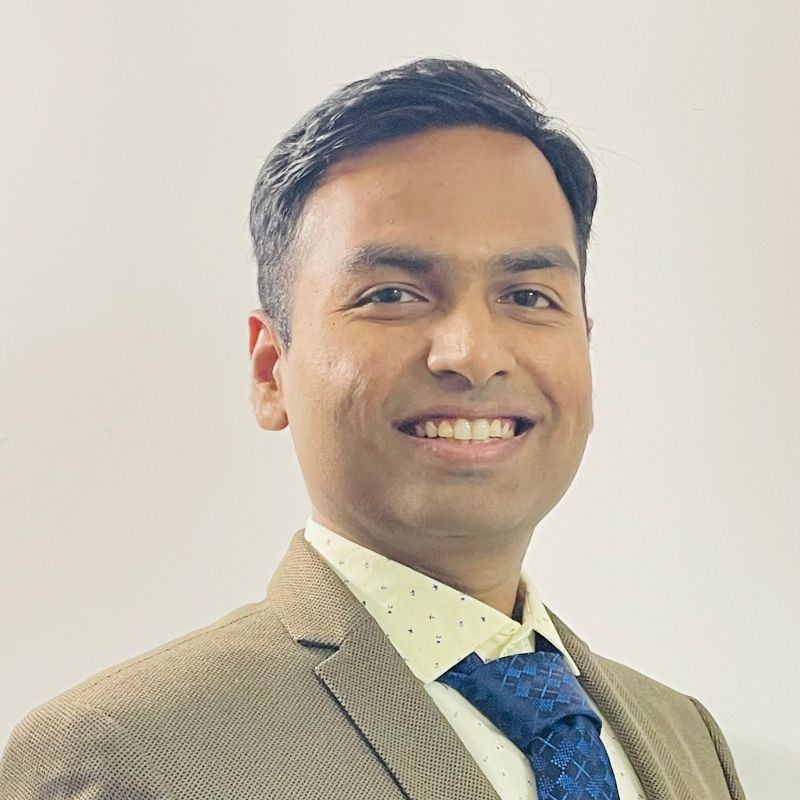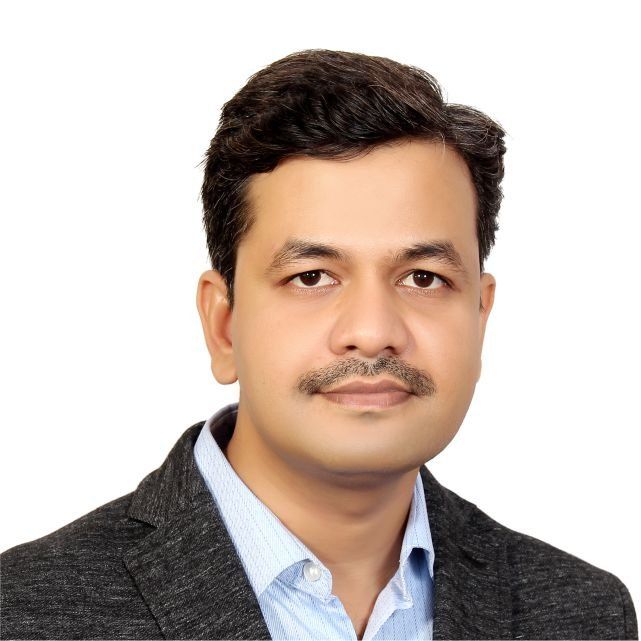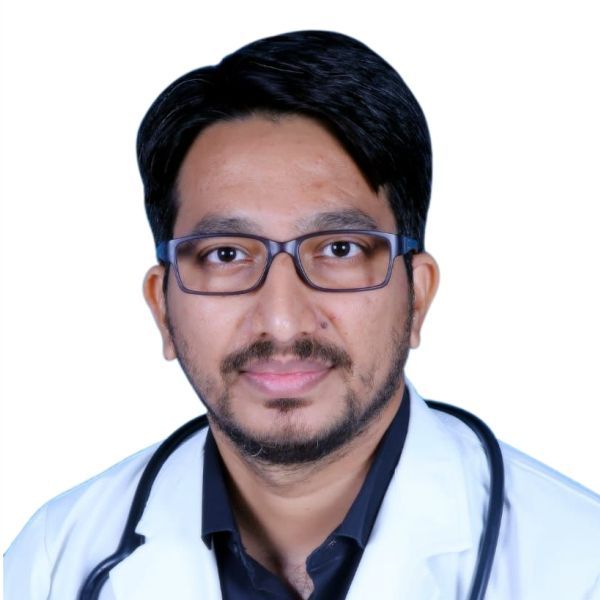Hyderabad’s Leading Super Specialist Doctor in Kolkata
"Award-winning team of Liver and Pancreas Specialist Doctor, Urologist, Nephrologist and Neurologist from Hyderabad visiting Kolkata, offering treatment for the most challenging and complex medical and surgical cases that may be benign or malignant conditions of GI tract and digestive system (including liver, pancreas, stomach, esophagus, gallbladder, bile ducts, small intestine, large intestine, rectum, and anus), ureters, bladder, urethra, kidneys, prostate gland, brain, spinal cord, peripheral nervous system, and muscles."
Request an appointment at Kolkata
Kolkata Appointment Enquiry
Suraksha Diagnostics, Kolkata (Barasat & Madhyamgram)
Call us or visit the clinic for an appointment.
Barasat
Date: 5 Dec 2024 – 10:30 am to 1 pm
Hyderabad’s Leading Liver and Pancreas Specialist Doctor in Kolkata - Best Hepatology Doctor
Dr. Govind Verma
MD, DM, Fellowship in EUS
Liver and Pancreas Specialist, GERD and IBD Expert
- Experience: 23+ years
- Expertise: Liver and Pancreas Diseases, Liver Transplant, Inflammatory Bowel Disease, Motility Disorder (Achalasia Cardia), GERD, Gastroenterology Disorders
- Procedure:
Endoscopic Procedures like ERCP, Endoscopic Ultrasound (EUS), Third Space Flexible Endoscopic Surgeries like POEM, ESD, EMR & Hepato-Billiary Pancreatic Interventions
Hyderabad's Leading Urologist in Kolkata - Best Urology Doctor
Dr. Abhik Debnath
MBBS, MS (General Surgery - IMS, BHU), MCh (Urology - CMC Vellore), DNB (Urology)
Consultant Laparoscopic Urologist, Endourologist, Andrologist & Kidney Transplant Surgeon
- Experience: 10+ years
- Expertise: Prostate related urinary problems including BPH and Prostate Cancer, Urological Cancers with special interest in Bladder Cancer, Minimally Invasive treatments for Kidney Stones, Kidney Transplantation, Reconstructive & Tropical Urology, Urological Health of the Ageing Male.
- Procedure:
Minimally Invasive Laser Kidney Stone Surgery, RIRS, Percutaneous nephrolithotomy (PCNL), Prostatectomy, Transurethral resection of the prostate (TURP), Transurethral incision of the prostate (TUIP), Nephrectomy, Vasectomy, Incontinence surgery, Ureteral stent placement, Varicocelectomy, Cystoscopy, Prostate biopsy etc.
Hyderabad's Leading Nephrologist in Kolkata - Best Nephrology Doctor
Dr. A Kishore Kumar
MD (Medicine) (JIPMER), DM (Nephrology) (AIIMS, New Delhi)
Nephrologist and Kidney Transplant Physician
- Experience: 11+ years
- Expertise: Kidney Transplantation, Glomerular Disease, Chronic Kidney Disease, Acute Kidney Injury, Hemodialysis, Peritoneal Dialysis, Autoimmune Kidney Diseases, Genetic Kidney Diseases, Critical Care Nephrology
- Procedure: Permcath Insertions, Kidney Biopsy, Peritoneal Dialysis Catheter Insertion
Hyderabad's Leading Neurologist in Kolkata - Best Neurology Doctor
Dr. S Pramod Kumar
MBBS, DNB (General Medicine), DM (Neurology)
Consultant Neurophysician & Neuromuscular Specialist
- Experience: 10+ years
- Expertise:
Brain Stroke, Epilepsy, Headache & Migraine, Neuropathy, Neck Pain & Back Pain, Parkinson's Disease, Dementia, Vertigo, Myasthenia Gravis, Meningitis (brain infection), Sleep disorders / insomnia
Patient Testimonials
Diseases and Conditions explained by doctors
Frequently Asked Questions (FAQs)
Who is Gastroenterologist?
A gastroenterologist doctors have an extensive understanding of the digestive system and the stomach. They also understand the problems related to the lungs, the kidneys, the liver, and other internal organs. They are highly qualified and will be able to give an accurate diagnosis. Not only that, but they are not limited to just treating heartburn, they treat any type of digestive system malfunction.
Some of the conditions that gastroenterologists specialize in treating any type of digestive system malfunction, esophageal disease, heartburn,
achalasia cardia,
pancreatitis,
gallbladder stones, esophagitis irritable bowel syndrome (IBS), GI bleeding, esophageal motility disorder,
Crohn's disease,
ulcerative colitis, irritable bowel syndrome, intestinal obstruction, gastroesophageal reflux disease (GERD), a bad taste in the mouth, diarrhea, abdominal bloating, mucus in the mouth, celiac disease,
colon cancer
and other digestive problems along with blood in the stool.
Who is Hepatologist (Liver Specialist)?
Hepatologists are the super specialist doctors, who deal with the body parts like the liver, the biliary tree, the gallbladder and the pancreas. They are experts in these organs if any disorders or malfunctions happen. They are experts in treating adults and pediatric patients.
Hepatologist deals with viral hepatitis and disease related to the alcohol consumption, which causes liver cirrhosis and other complications. If a patient is suffering from drug overdose, gastrointestinal bleeding from portal hypertension, jaundice, ascites, Liver Cancer, Fatty liver, Liver Tumor, Hepatic Fibrosis enzyme defects or blood tests that indicate liver disease, then the patient in any hospital would be referred to the hepatologist in this case.
Endoscopic retrograde cholangiopancreatography (ERCP), transhepatic pancreato-cholangiography (TPC) or transjugular intrahepatic portosystemic shunt (TIPSS) are some of the procedures that are performed by the hepatologist to diagnose and treat the patients.
Who is Urologist?
A urologist is a doctor who specializes in the diagnosis and treatment of diseases of the urinary tract and male reproductive organs. The urinary tract consists of the ureters, bladder, urethra and the kidneys. The male reproductive organs have the penis, testicles, and prostate gland.
Urologists are highly trained and skilled doctors who are experts in catering comprehensive care for a wide range of urinary tract and reproductive health issues, including Urinary tract infections, Kidney stones, Prostate problems, Infertility and more.
The specific procedure that a urologist will perform will depend on the patient's individual needs and diagnosis. Some of the widely performed procedures include:
- Cystoscopy: It is a diagnostic procedure done by a urologist by inserting a thin, flexible tube with a camera on the end into the bladder through the urethra. This allows the doctor to see the inside of the bladder and urethra.
- Kidney biopsy: A kidney biopsy is an interventional procedure performed by an expert to remove a small piece of tissue from the kidney. This is done to diagnose kidney disease or to check for cancer.
- Prostate biopsy: A prostate biopsy is an interventional procedure in which a doctor removes a small piece of tissue from the prostate gland. This is done to diagnose prostate cancer or to check for other prostate problems.
- Vasectomy: A vasectomy is a procedure in which the vas deferens, tubes that carry sperm from the testicles, are cut and sealed. This prevents sperm from coming out of the penis during ejaculation.
- Ureteroscopy: A ureteroscopy is a diagnostic interventional procedure performed by an expert by inserting a thin, flexible tube with a high resolution camera on the end into the ureter. This allows the doctor to see the inside of the ureter and to remove any blockages or stones.
- Nephrectomy: A nephrectomy is a procedure in which the kidney is removed. This is done to treat kidney cancer or other kidney problems.
- Urethroplasty: A urethroplasty is a procedure in which the urethra is repaired. This is done to treat urethral strictures, which are narrowing of the urethra.
- Percutaneous nephrolithotomy (PCNL): This procedure involves making a small incision in the back and inserting a tube into the kidney to remove kidney stones.
- Retrograde Intrarenal Surgery (RIRS): RIRS is a minimally invasive procedure to remove the stones from the kidneys. The urologist will execute the procedure to ensure that the patient receive the best possible care.
- Transurethral resection of the prostate (TURP): This procedure involves using a thin, flexible instrument to remove tissue from the prostate gland to relieve blockage and improve urinary flow.
- Transurethral incision of the prostate (TUIP): This procedure involves making small incisions in the prostate gland to relieve blockage and improve urinary flow.
- Urodynamic studies (UDS): It is referred to a set of tests that check how well the parts of the lower urinary tract, such as the bladder, sphincters, and urethra, are working to store and release urine. Most
urodynamic tests may focus on how well the person's bladder can hold and empty the urine, and they also show why there could be blockages and whether the bladder is contracting when it is not supposed to, causing a leak of the urine.
Who is Nephrologist?
The nephrologist is the kidney specialist. He works in the hospital and is responsible for the medical aspect, but not the surgery (it is the urologist who performs the surgeries on the kidneys or the urinary tract). For this, he performs numerous medical procedures. First, he asks his patient, in particular, to obtain information on any family or medical history:
- He performs a rigorous clinical examination
- He may perform or order examinations, such as an ultrasound of the kidneys and urinary tract, a ct scan, a renal biopsy
- He follows dialysis patients, takes care of the post-operative consequences of a kidney transplant
- He also prescribed drug treatments, and offered dietary advice
The diseases including diabetes and hypertension also affect the kidney adversely, and it is a nephrologist who deals with avoiding and treating the kidney damage caused by these systemic or whole body diseases as well. Nephrologists treat disease and kidney disorders, including:
- Fluid and electrolyte disturbances
- Acid-base disorders
- Kidney stones
- Glomerular diseases
- Tubulointerstitial disease
- Mineral metabolism
- Acute kidney disease
- Acute renal failure
- Chronic kidney disease
- Chronic renal failure
- Kidney disease and end stage dialysis
Nephrologists are well aware of medications and clinical pharmacology, management of hypertension, management of diabetes and its complications, epidemiology of diseases and infections as well as nutritional management for the prevention and treatment of kidney diseases.
Who is Neurologist?
Neurologists are medical doctors who specialize in diagnosing and treating conditions that affect the nervous system, which includes the brain, spinal cord, and nerves. Here are some of the conditions that neurologists commonly treat:
- Headaches and migraines
- Seizure disorders, such as epilepsy
- Stroke and transient ischemic attacks (TIAs)
- Multiple sclerosis (MS)
- Parkinson's disease and other movement disorders
- Alzheimer's disease and other dementias
- Peripheral nerve disorders, such as neuropathy
- Amyotrophic lateral sclerosis (ALS) and other motor neuron diseases
- Brain and spinal cord injuries
- Infections of the nervous system, such as meningitis or encephalitis
- Tumors of the brain or spinal cord
- Sleep disorders, such as insomnia or sleep apnea
- Neuromuscular disorders, such as myasthenia gravis
- Developmental and learning disorders, such as attention deficit hyperactivity disorder (ADHD)
Neurologists use a variety of methods to diagnose and treat these conditions, including physical exams, imaging tests (such as MRI or CT scans), lumbar punctures, and electrical tests (such as EEGs or nerve conduction studies). Treatment options may include medication, surgery, physical therapy, or lifestyle changes.
Who is Kidney Transplant Surgeon?
A kidney transplant surgeon is a medical doctor who specializes in the surgical removal and transplantation of kidneys. They are typically trained in general surgery and urology, and have additional training in kidney transplantation. Kidney transplant surgeons perform a variety of procedures, including:
- Kidney removal: This is the process of removing a kidney from a donor.
- Kidney transplantation: This is the process of implanting a donor kidney into a recipient.
- Living donor nephrectomy: This is the process of removing a kidney from a living donor.
- Kidney biopsy: This is the process of taking a small sample of tissue from a kidney to be examined under a microscope.
Kidney transplant surgeons work closely with other healthcare professionals, such as nephrologists, anesthesiologists, and nurses, to provide the best possible care for their patients. They are responsible for the overall care of patients undergoing kidney transplantation, from pre-transplant evaluation to post-transplant follow-up.






